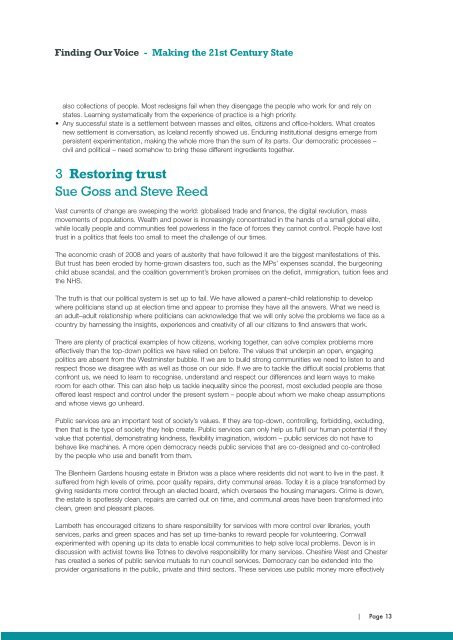Compass-Finding-Our-Voice-Final1
Compass-Finding-Our-Voice-Final1
Compass-Finding-Our-Voice-Final1
Create successful ePaper yourself
Turn your PDF publications into a flip-book with our unique Google optimized e-Paper software.
<strong>Finding</strong> <strong>Our</strong> <strong>Voice</strong> - Making the 21st Century State<br />
also collections of people. Most redesigns fail when they disengage the people who work for and rely on<br />
states. Learning systematically from the experience of practice is a high priority.<br />
• Any successful state is a settlement between masses and elites, citizens and office-holders. What creates<br />
new settlement is conversation, as Iceland recently showed us. Enduring institutional designs emerge from<br />
persistent experimentation, making the whole more than the sum of its parts. <strong>Our</strong> democratic processes –<br />
civil and political – need somehow to bring these different ingredients together.<br />
3 Restoring trust<br />
Sue Goss and Steve Reed<br />
Vast currents of change are sweeping the world: globalised trade and finance, the digital revolution, mass<br />
movements of populations. Wealth and power is increasingly concentrated in the hands of a small global elite,<br />
while locally people and communities feel powerless in the face of forces they cannot control. People have lost<br />
trust in a politics that feels too small to meet the challenge of our times.<br />
The economic crash of 2008 and years of austerity that have followed it are the biggest manifestations of this.<br />
But trust has been eroded by home-grown disasters too, such as the MPs’ expenses scandal, the burgeoning<br />
child abuse scandal, and the coalition government’s broken promises on the deficit, immigration, tuition fees and<br />
the NHS.<br />
The truth is that our political system is set up to fail. We have allowed a parent–child relationship to develop<br />
where politicians stand up at election time and appear to promise they have all the answers. What we need is<br />
an adult–adult relationship where politicians can acknowledge that we will only solve the problems we face as a<br />
country by harnessing the insights, experiences and creativity of all our citizens to find answers that work.<br />
There are plenty of practical examples of how citizens, working together, can solve complex problems more<br />
effectively than the top-down politics we have relied on before. The values that underpin an open, engaging<br />
politics are absent from the Westminster bubble. If we are to build strong communities we need to listen to and<br />
respect those we disagree with as well as those on our side. If we are to tackle the difficult social problems that<br />
confront us, we need to learn to recognise, understand and respect our differences and learn ways to make<br />
room for each other. This can also help us tackle inequality since the poorest, most excluded people are those<br />
offered least respect and control under the present system – people about whom we make cheap assumptions<br />
and whose views go unheard.<br />
Public services are an important test of society’s values. If they are top-down, controlling, forbidding, excluding,<br />
then that is the type of society they help create. Public services can only help us fulfil our human potential if they<br />
value that potential, demonstrating kindness, flexibility imagination, wisdom – public services do not have to<br />
behave like machines. A more open democracy needs public services that are co-designed and co-controlled<br />
by the people who use and benefit from them.<br />
The Blenheim Gardens housing estate in Brixton was a place where residents did not want to live in the past. It<br />
suffered from high levels of crime, poor quality repairs, dirty communal areas. Today it is a place transformed by<br />
giving residents more control through an elected board, which oversees the housing managers. Crime is down,<br />
the estate is spotlessly clean, repairs are carried out on time, and communal areas have been transformed into<br />
clean, green and pleasant places.<br />
Lambeth has encouraged citizens to share responsibility for services with more control over libraries, youth<br />
services, parks and green spaces and has set up time-banks to reward people for volunteering. Cornwall<br />
experimented with opening up its data to enable local communities to help solve local problems. Devon is in<br />
discussion with activist towns like Totnes to devolve responsibility for many services. Cheshire West and Chester<br />
has created a series of public service mutuals to run council services. Democracy can be extended into the<br />
provider organisations in the public, private and third sectors. These services use public money more effectively<br />
| Page 13


